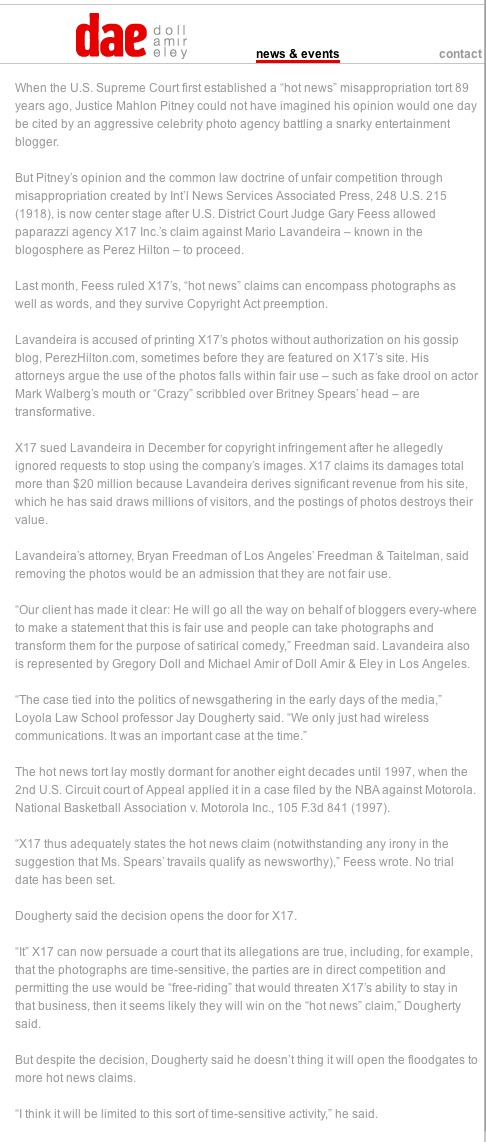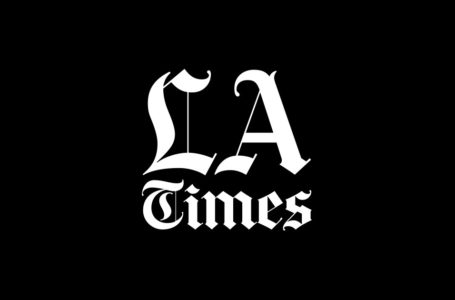When the U.S. Supreme Court first established a “hot news” misappropriation tort 89 years ago, Justice Mahlon Pitney could not have imagined his opinion would one day be cited by an aggressive celebrity photo agency battling a snarky entertainment blogger.
But Pitney’s opinion and the common law doctrine of unfair competition through misappropriation created by Int’l News Service v. Associated Press, 248 U.S. 215 (1918), is now center stage after U.S. District Court Judge Gary Feess allowed paparazzi agency X17 Inc.’s claim against Mario Lavandeira — known in the blogosphere as Perez Hilton — to proceed.
Last month, Feess ruled X17’s “hot news” claims can encompass photographs as well as words, and they survive Copyright Act preemption.
Lavandeira is accused of posting X17’s photos without authorization on his gossip blog, PerezHilton.com, sometimes before they are featured on X17’s site. His attorneys argue the use of the photos falls within fair use and that Lavandeira’s crude drawings — such as fake drool on actor Mark Wahlberg’s mouth or “Crazy” scribbled over Briney Spears’ head — are transformative.
X17 sued Lavandeira in December for copyright infringement after he allegedly ignored requests to stop using the company’s images. X17 claims its damages total more than $20 million because Lavandeira derives significant revenue from his site, which he has said draws millions of visitors, and the posting pf photos destroys their value.
“Every single day, we send him and his army of attorneys a very specific notice of which photographs (infringe) and ask him to take them down and he does not respond,” said X17 attorney John Tehranian of Costa Mesa’s Turner Green Afrasiabi & Arledge.
Lavandeira’s attorney Bryan Freedman of Los Angeles’ Freedman & Taitelman, said removing the photos would be an admission that they are not fair use.
Our client has made it clear: He will go all the way on behalf of bloggers everywhere to make a statement that this is fair use and people can take photographs and transform them for the purpose of satirical comedy.
Bryan Freedman
Lavandeira also is represented by Gregory Doll and Michael Amir of Doll Amir & Eley in Los Angeles.
In January, Tehranian added the “hot news” claim under the theory that X17’s Web site, x17online.com, is in direct competition with Lavandeira’s site.
X17 also posts celebrity gossip and commentary, as well as its exclusive photos. The company sells “scoops” to magazines and Web sites, and claims Lavandeira has posted photos even as it negotiates to sell the same images. X17 says it does not know how Lavandeira obtains its images, but that he is not merely copying them from its site.
“It is hard to meet the elements of misappropriation (of hot news) because it’s hard to prove, but it hits it head-on in our case,” said Tehranian, who also teaches copyright law at the University of Utah.
The 1918 case involved competing wire services covering World War I. The Associated Press accused INS of taking its stories and sending them out as INS stories. A split Supreme Court ruled that while facts are not copyrightable, the AP owned limited property rights in the news it published.
Further, Justice Pitney wrote that INS’ practices amounted to unfair competition because AP expended significant time, money and labor collecting, organizing and disseminating the news.
“The news has value to the gatherer “dependent chiefly upon its novelty and freshness, the regularity of the service, its reputed reliability and thoroughness and its adaptability to the public needs; but also, as is evident, the news has an exchange value to one who can misappropriate it,” Pitney wrote.
“The case tied into the politics of newsgathering in the early days of the media,” Loyola Law School professor Jay Dougherty said. “We only just has wireless communications. It was an important case at the time.”
The hot news tort lay mostly dormant for another eight decades until 1997, when the 2nd U.S. Circuit Court of Appeal applied it in a case filed by the NBA against Motorola. National Basketball Association v. Motorola Inc., 105 F.3d 841 (1997).
The electronics company had introduced a pager that provided real-time scores and information of the NBA games. The league brought claims including copyright infringement and commercial misappropriation under New York law, and sought to enjoin Motorola, as well as America Online, which provided similar information.
The court ruled that to state a hot news claim and survive Copyright Act preemption, three elements were required: a time-sensitive value to the information; free-riding by the defendant; and a threat to the very existence of the product provided by the NBA.
The court found that none of the elements were met and that professional basketball games are not “original works of authorship” protected by the Copyright Act.
Dougherty said the NBA court narrowly interpreted the 1918 case to stop any countervailing lawsuits.
“The risk here is that people could use this tort to suppress the flow of information to the public and do so in a way that goes beyond the rights of copyright owners,” he said.
The X17 case brings Int’l News into the blogging era. Feess, in his Feb. 9 decision rejecting Lavandeira’s motion to dismiss, ruled X17 had viable claims under the three elements provided in the NBA because the celebrity photos are as time-sensitive as words and data.
“X17 thus adequately states the hot news claim (notwithstanding any irony in the suggestion that Ms. Spears’ travails qualify as newsworthy),” Feess wrote. No trial date has been set.
Dougherty said the decision opens the door for X17.
“If X17 can now persuade a court that its allegations are true, including, for example, that the photographs are time-sensitive, the parties are in direct competition and permitting the use would be ‘free-riding’ that would threaten X17’s ability to stay in that business, then it seems likely they will win on the ‘hot news’ claim,” Dougherty said.
But despite the decision, Dougherty said he doesn’t think it will open the flood-gates to more hot-news claims. “I think it will be limited to this sort of time-sensitive activity,” he said.





